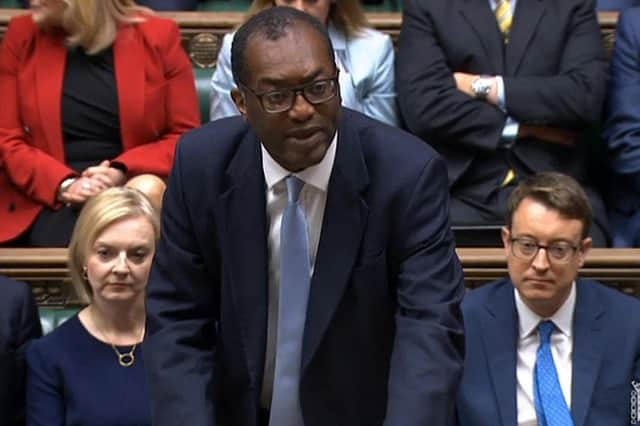Chancellor Kwasi Kwarteng's 'mini-budget' looks set to be a costly mistake of historic proportions – Scotsman comment


What sort of repercussions, though? For answers, one could look to the City of London, for whom this was hailed as a breakthrough: welcome love from the government after years of frosty relations. Yesterday, bankers learned their bonuses would have limits lifted, corporation tax lowered and the topmost tax rate entirely scrapped.
Trebles all round? Not so fast. Those bankers, paid to form judgements on behalf of their investors, took one look at Kwarteng's package of proposals and chose to sell off government debt and the pound, which quickly fell to a level not seen since 1985. For them, the combination of soaring public debt, reduced means to pay it off and a world in economic turmoil all adds up to Britain being a risky bet.
Advertisement
Hide AdAdvertisement
Hide AdIf the bankers' judgement is right, getting out of the UK will make their clients some money, and they will be handsomely rewarded next bonus season. At least the measures that prompted their sell-off will ensure their bonus is unfettered, and more lightly taxed. Oh, the irony.
Beyond the concerns of investors, at the core of this "borrow and hope Budget” is the theory that debt-financed tax cuts for the rich will fire up the wealth generators, and encourage them to spend their more lightly-taxed earnings on goods and services supplied by everyone else. Energy subsidies for all, meanwhile, will do the immediate work of protecting society's most vulnerable members. Moreover, the package hopes to achieve all this while not driving up inflation, or damaging the pound.
We have already offered our wholehearted backing for support on energy prices. Kwarteng's opening statement on the potential for ruinously high energy bills – "we were never going to let this happen" – was doubtless reassuring to millions.
But it was a later passage, on "solving the riddle of growth" that captured the attention of most – even in Scotland, where the SNP faces a conundrum in deciding if it is to follow Kwarteng's lower-tax path. "Our plan is to expand the supply side of the economy through tax incentives and reform," Kwarteng told the House of Commons. "That is how we will turn the vicious cycle of stagnation into a virtuous cycle of growth."
Supply-side reform might better be known as "trickle down" economics: allowing businesses, and the rich, to keep more of their income, in the hope they will spend more of it on goods and services supplied by the rest of us.
This theory does offer a moral case for the tax cuts and incentives. But the evidence for "trickle down" economics' success is not strong. A study of 50 years of attempts to make it work, published in 2020 by London School of Economics academics, found little trickled anywhere: tax cuts for the wealthy made them more wealthy, and did not promote jobs or growth. Other studies have shown business tax cuts – such as yesterday's cancellation of the corporation tax rise – did not boost investment.
The odds, then, are against Kwarteng's plan. And failure at this scale will ensure harsh judgement. His budget will, rightly, be seen as distribution of borrowed money to the richest in society, at a time when debt – and inflation – was already vast because of pandemic and war. The costs of that mis-step will be faced by generations to come.
We hope, for all our sakes, that Kwarteng is right, and experience – and markets – are wrong. But, a little like the bankers themselves perhaps, we wouldn't bet against data and history. And that points to yesterday's statement being an historic, and costly, mistake.
Comments
Want to join the conversation? Please or to comment on this article.
